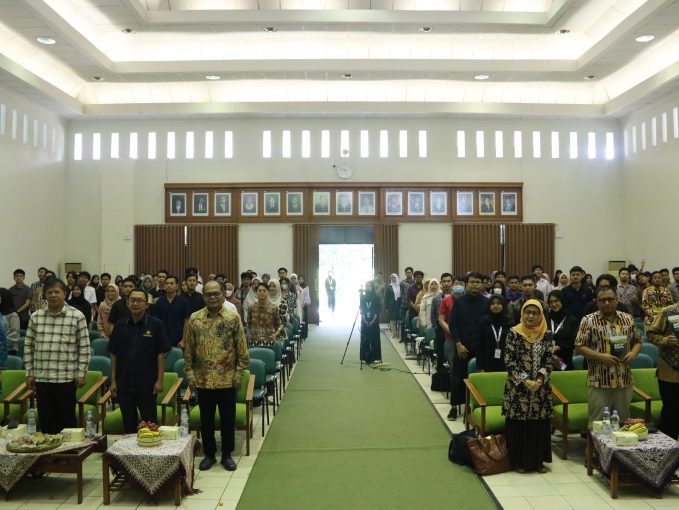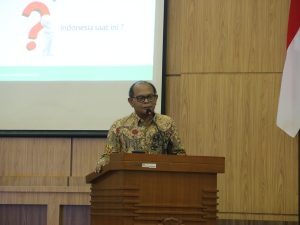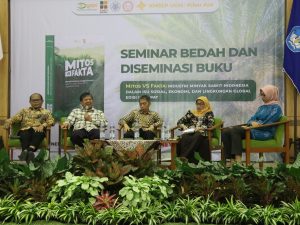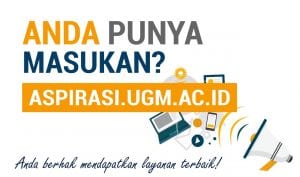
(Photo: group photo with invited guests)
Yogyakarta, May 4, 2024 A book review and dissemination event entitled “Myths vs. Facts: The Indonesian Palm Oil Industry in Global Social, Economic, and Environmental Issues, Fourth Edition” was successfully held on May 4, 2024, at the Faculty of Agriculture, Gadjah Mada University. More precisely, this seminar was held at the Hardjono Danoesastro Auditorium, Faculty of Agriculture, UGM.
This review seminar and book dissemination are the result of collaboration between the Gadjah Mada University Agricultural Socioeconomic Student Family (KMSEP) and the Palm Oil Agribusiness Strategic Policy Institute (PASPI), which is supported by the Palm Oil Plantation Fund Management Agency (BPDPKS).
The book “Myths vs. Facts: The Indonesian Palm Oil Industry in Global Social, Economic, and Environmental Issues” is the work of PASPI based on observations and analysis of palm oil issues based on data and empirical studies. This book summarizes palm oil issues and myths that are often discussed by society both in Indonesia and at the global level. Palm oil issues discussed in this book include social, economic, nutritional/health, and environmental issues. With such complexity of content, this book is used as a “handbook” for palm oil actors (farmers and corporations), the government, and Indonesian ambassadors abroad to counter the black campaign that condemns oil and promotes the positive value of palm oil.
Thanks to the support of BPDPKS, the Palm Oil Myths vs. Facts Book was updated again and published in its fourth edition. In this latest edition, apart from updating data and empirical studies, PASPI also includes palm oil issues that are relevant to current conditions, such as palm oil trade policies in importing countries.
Opening the book review seminar, the Dean of the UGM Faculty of Agriculture, Mr. Ir. Jaka Widada, M.P., Ph.D., revealed in his speech that the Palm Oil Myths and Facts Book could arouse the interest of the younger generation to know and care more about the palm oil industry. Then, he also hopes that holding this seminar can provide useful knowledge to seminar participants regarding the ins and outs of the palm oil industry. Moreover, the palm oil industry is very promising as a sustainable industry, so it really needs to be paid attention to by the younger generation.
In the first discussion session, Dr. Ir. Tungkot Sipayung, who is the Executive Director of PASPI, said that palm oil is the most superior vegetable oil compared to other vegetable oils. With high productivity, palm oil only requires relatively little land but is able to produce oil in larger volumes, so the price is the most competitive. Palm oil is also very versatile because it can be used as a raw material to produce products that are used by people around the world 24 hours a day, a day, from waking up to going to sleep.

(Photo: Dr. Ir. Tungkot Sipayung, Executive Director of PASPI.)
The head of the team that compiled the book Palm Oil Myths vs. Facts also reiterated that palm oil contributes to the village, regional, national, and global economies. Various empirical studies at national and global levels also show that palm oil contains nutrients that are beneficial for body health. Recent studies also show that palm oil is relatively more environmentally friendly because it produces lower emissions and biodiversity loss compared to other vegetable oils. This shows that palm oil has excelled. So, to defeat and disrupt palm oil on the world market, competitors are spreading black campaigns that damage the image of palm oil in the eyes of the world.
This book review seminar was also attended by lecturers at UGM as book reviewers, namely Prof. Dr. Jamhari, S.P., M.P., (Professor at the UGM Faculty of Agriculture), Prof. Dr. Ir. Sri Raharjo, M.Sc., (Professor at the Faculty of Agricultural Technology UGM), and Dr. Siti Mutiah Setiawati, M.A., (Lecturer at FISIPOL UGM).

(Photo: Dissection lecturers and book discussants)
Even though they come from different study program backgrounds, the three lecturers agreed that this book could become a piece of literature used by students, researchers, lecturers, and palm oil stakeholders abroad and domestically to refute negative palm oil issues that have been widely spread. . This book discusses the palm oil industry very comprehensively by comparing the myths and facts described with systematic and comprehensive data.
Through this book review seminar, Myths vs. Facts about Palm Oil, Fourth Edition, it is hoped that it can open the gates and expand insight for the public, especially students, regarding the facts about palm oil in social, economic, and environmental aspects. It is also hoped that after this seminar, students will be able to filter palm oil news and issues and carry out cross-checks so that they are not easily consumed by hoaxes.
Writer:
Imelia Barca (Sosek 2023)
Xenia Ezra Amanta (Sosek 2022)


